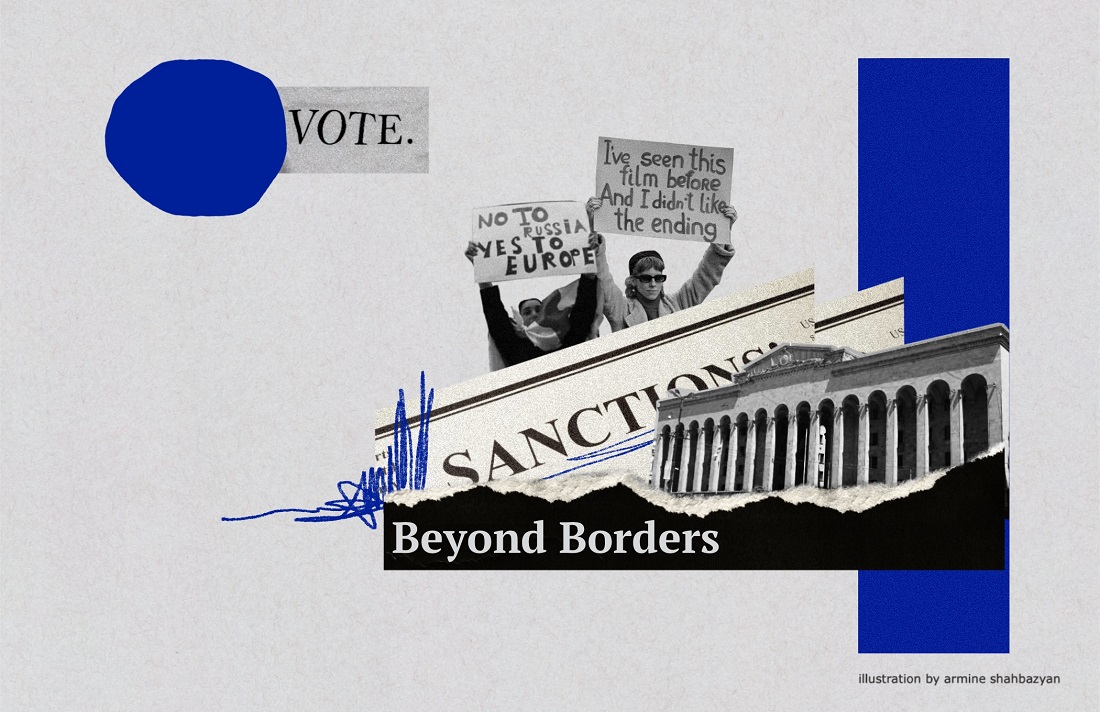Beyond Borders
This column explores the key issues shaping life in the South Caucasus, focusing on how the divergent paths of Georgia, Armenia and Azerbaijan reflect the region’s complex histories, economic developments, and political shifts. While new generations in these countries grow more isolated from one another due to language barriers and conflicting national trajectories, the same is true for local policymakers, who are often more familiar with distant capitals than their immediate neighbors. Each nation seeks its own path, sometimes in conflict with others, while international actors often treat the region as a whole, reluctant to craft policies specific to individual states. Drawing on personal experience with the region’s revolutions, conflicts and transformations, Olesya brings you Beyond Borders—a column exploring how decisions made in one corner of the South Caucasus impact all who live there.

Listen to Vartanyan’s personal reading of the article.
I live next door to a vocal parliamentarian from Georgia’s ruling party. For a long time, my grievances were minor—the scraping of chairs late at night or sporadic karaoke sessions featuring Soviet-era ballads. But this spring, everything changed. Our apartment building became an unwitting front in the ongoing battle between the ruling Georgian Dream party, and protesters who had occupied the streets of Tbilisi for weeks, rallying against a controversial “foreign agents” law that threatened to derail Georgia’s integration with the West.
One morning, I woke to find large graffiti scrawled across the building, a message aimed at the Georgian Dream MP. A few days later, a seemingly innocuous post from his wife in our neighborhood Facebook group about a parking issue unleashed a torrent of angry, politically charged comments from neighbors. What began as online grumbling soon escalated: after overhearing threats at the local shop, the family quietly sent their two children off to the countryside, fearing for their safety. The word “traitor” had already been whispered one too many times.
Months have passed, but the anger has only intensified. Tbilisi’s streets are now plastered with electoral posters from the ruling party, warning of a new war should they lose, using images of Ukraine’s devastated towns as a grim reminder. Each day, Georgian media and watchdog groups uncover new evidence of vote-buying and the misuse of state resources to bolster Georgian Dream’s campaign. Bidzina Ivanishvili, the party’s founder—an oligarch who built his fortune in 1990s Russia—now campaigns from behind a bulletproof box, promising to purge the opposition and its supporters if his party wins.
No one knows exactly how things will play out in Georgia. Polls show Georgian Dream in the lead, but whether that support will be strong enough to form a government without a coalition remains uncertain. According to pollsters, a significant segment of the electorate is undecided—a familiar dynamic in Georgian politics, where these voters often hold the balance of power. However, for many in Tbilisi, the real drama isn’t expected on election day, October 26, but in the aftermath, when much-anticipated street protests are likely to erupt. These protests are set to unite opposition forces and civil society groups, many of whom have already raised concerns about the fairness of the vote. What remains unclear is the scale and intensity of these demonstrations—whether they will turn violent and whether they will attract international attention. These factors, more than the ballots themselves, may ultimately define the outcome.
Whatever the result in Georgia, its impact will ripple across the border into Armenia. Beyond potential logistical disruptions—like delays to Armenian cargo traveling through Georgia en route to Russian markets—the effects could stretch further, impacting Armenia’s economy, security, and political future. For Armenians, the outcome of the Georgian elections may prove as consequential as the U.S. presidential race.
Georgia: The New Iran?
One of the key risks Georgia faces after the elections is the threat of isolation from the West. If Georgian Dream claims victory amid allegations of fraud, or if post-election protests turn violent, the United States is prepared to impose sanctions on top figures in the ruling party, including its founder, Bidzina Ivanishvili. U.S. officials have indicated that sanctions lists are ready, awaiting only the necessary trigger.
Washington is poised to act swiftly if the government resorts to force against protesters, but addressing election violations is trickier. Foreign observers, now flooding Georgia, will scrutinize the process closely, and any significant misstep could spark a response. However, the decision to impose sanctions may depend not only on Georgia’s election outcome but also on America’s own. Some Biden officials are reportedly eager to enact penalties against Georgian leadership, especially if Donald Trump wins. Such sanctions could endure well into 2025, even if the U.S. administration changes hands.
For the European Union, sanctions present a more delicate challenge. Unlike Washington, Brussels requires unanimous support from all member states. Hungary, a steadfast ally of Georgian Dream, has continued high-level engagements with the Georgian leadership, even as other Western nations have distanced themselves. Still, the EU has found ways to pressure Hungary before, such as when it imposed sanctions on Russia or supported Armenia despite Hungary’s close ties with another ally, Azerbaijan. If Georgia’s election proves particularly contentious, the EU could impose sanctions of its own, or individual member states could take action. In this scenario, France could play an important role, given that Ivanishvili, among his many passports, holds a French one.
The effects of sanctions, if imposed, would be swift and severe. In mid-September, when Washington sanctioned just two mid-level Georgian officials, the country’s currency began to devalue, businesses—particularly Western ones—suspended or withdrew their investments, and local banks found themselves in a precarious position. They faced a choice between adhering to U.S. sanctions or following guidance from the Georgian National Bank, which prioritized local laws. This choice risked alienating the global financial system or, worse, inviting penalties for evading sanctions. If sanctions target more high-profile figures—especially Ivanishvili, whose wealth eclipses Georgia’s national budget—the consequences would be even more dire. Ivanishvili’s sprawling financial empire, with assets across the globe and children living in the United States, could set off a chain reaction in Georgia’s already fragile economy.
These challenges won’t be confined to Georgia. Armenia, its southern neighbor, will inevitably feel the tremors. In the past two years, Georgia has nearly doubled its investments in Armenia, and Georgian goods and businesses have become a familiar presence in Armenian markets. Just months ago, one of Georgia’s largest banks acquired Armenia’s Ameriabank. Should Georgia’s economy falter under the weight of sanctions, Armenia would likely suffer too. And the longer-term implications are no less troubling. If foreign investors begin to pull out of Georgia, Armenia—already struggling to attract international capital—could also find itself more isolated. Both countries might become increasingly dependent on regional powers like Russia, Turkey and Azerbaijan, or worse, on entities already sanctioned by the U.S., such as certain Chinese firms. This is not a particularly desirable future for either Georgia or Armenia.
More Russia in the Region
Russia is watching Georgia closely. The ruling Georgian Dream party has been a reliable ally, deftly avoiding actions that might antagonize Moscow—even in the wake of Russia’s invasion of Ukraine, which drew sharp condemnation from Georgia’s key Western partners. If Georgian Dream remains in power, Russia could gain an even more loyal and dependent neighbor, one increasingly constrained by its deteriorating relationship with the West. Such an outcome would not only bolster Russia’s potential to wield influence over Georgia’s strategic transport routes and infrastructure projects but also enhance its dominance over the South Caucasus region, including Armenia, which has recently revived its efforts to forge ties with the West.
Since coming to power in 2012, Georgian Dream has been the most Moscow-friendly government Georgia has seen in recent history. Following the 2008 war, Russia and Georgia embarked on a process of normalization, restoring trade and limited contact. Over a decade later, their relations are essentially normalized: Russian citizens travel freely to Georgia for vacations, purchase property, and invest in local businesses. Last year, Russia resumed direct flights to Georgian cities and lifted visa requirements that had been in place for over two decades. “Only the formalities remain,” a Russian official remarked to me this summer, hinting at the potential for restoring full diplomatic relations, if Georgian Dream retains power after the election.
What has hindered a complete rapprochement is the legacy of the 2008 Russo-Georgian war. After its brief military invasion, Russia recognized the independence of Georgia’s two breakaway regions—Abkhazia and South Ossetia—and stationed troops there, bolstering its military presence with significant investments. These forces are positioned not only to exert control over Georgia but also to extend Moscow’s reach across the region. Russian soldiers, military bases, and watchtowers are easily visible along Georgia’s main East-West highway, the route many Armenians travel in the summer to the coastal city of Batumi. For Georgia and Russia to fully restore diplomatic relations, Tbilisi would likely have to acquiesce to Russia’s military presence and formal control over Abkhazia and South Ossetia—massive concessions that would be hard for Georgian society to accept. However, if Georgia finds itself increasingly isolated by the West, it may have little choice but to consider such a deal, especially if Russia presents enticing offers in return.
Moscow’s control over Georgia’s breakaway regions gives it multiple levers to influence events if the upcoming elections or subsequent protests threaten its interests. Georgian opposition leaders warn that even a minor provocation in one of the conflict zones could spread fear among the populace, driving protesters off the streets. Even without immediate chaos, Russia’s military presence in these regions offers it a ready tool to undermine any new political leadership in Georgia, potentially plunging both the country and the broader South Caucasus into deeper instability.
By tightening its grip on Georgia, Russia could reassert—and even expand—its influence over the entire South Caucasus. Such a shift would inevitably limit Armenia’s maneuverability, especially as it seeks to pivot westward following its defeat in the 2020 war. As the fate of Nagorno-Karabakh became clearer last summer, I asked a Russian analyst with close ties to the government whether Moscow’s setbacks there would weaken its influence in Armenia and across the region. He shrugged, unconcerned. “Why should we worry?” he said. “We still have Georgian Dream.” The upcoming elections in Georgia will soon reveal whether those words were prophetic—or just wishful thinking.


